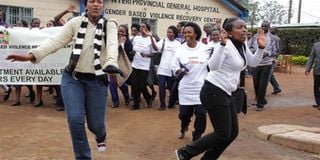One-stop GBV centres; lessons from Rwanda

What you need to know:
- One-stop centre for SGBV could ease the pain of survivors seeking police, legal, medical and psychosocial support.
- Rise in numbers of the facilities, in Rwanda, from one in 2009, to 44 in 2019 is among the greatest implementation successes of the anti-GBV policy.
- At these centres, survivors access medical care, psychosocial support, police and legal support as well as facilitation in collection of evidence.
- Director for Community Policing and Gender at the National Police Service Judy Lamet indicated plans to establish a one-stop centre for GBV in Nairobi County.
Ms Liza* (identity protected to keep her safe as she pursues justice) did not know reporting violence meted out to her by her husband would be equally, emotionally draining.
Her spouse of eight years had on July 4, this year burnt the 26-year-old with hot tea. This happened in their rented double-room house in Korogocho, Nairobi County after disagreeing over financial contribution towards her uncle's burial.
She was left with second degree burns on her neck, back and chest. She first got treatment at a private hospital in Eastleigh then went to Kariobangi Police Station to report.
"I was asked for a doctor's report in order to get the P3 form (The Kenya Police Medical Examination Report). So, I went back to the hospital using a motorbike. I was charged Sh200 to and fro which my sister paid since I did not have even a shilling, having stopped my business due to Covid-19 outbreak," explains Ms Liza.
She returned with the examination report and a police officer filled the designated section in the P3 Form. She was then asked to have a medical officer fill in details of the examination, then submit the form. That needed her to go back to hospital.
BURDENSOME
"I wondered, 'Is this not too much?' I felt more tormented but I had no choice. I still went back to the hospital, did the expected and filed the P3 with the police. But it was exhausting and burdensome as I kept asking my sister for facilitation money," she says.
Ms Liza's case reflects the struggles women, children and men across the country go through when reporting sexual and gender-based violence (SGBV) cases.
But a one-stop centre for SGBV could ease the pain of survivors seeking police, legal, medical and psychosocial support.
Rwanda, for instance, has an Anti-GBV Policy (2011) which declares zero tolerance to any for GBV. It provides for progressive elimination of GBV through the development of a preventive, protective, supportive and transformative environment.
It has established one-stop centres for GBV across the country making it easier for survivors to access the necessary services within one station.
And rise in numbers of the facilities from one in 2009, to 44 in 2019 is among the greatest implementation successes of the anti-GBV policy, indicates CARE Nederland in its analysis on Rwanda's progress in tackling GBV.
At these centres, survivors access medical care, psychosocial support, police and legal support as well as facilitation in collection of evidence.
In Kenya, progress is being made towards this direction.
ANTI-GBV POLICIES
There are various legislations that prohibit GBV including Protection against Domestic Violence Act (2015) which provides for the protection and relief of victims of domestic violence.
The Sexual Offence Act (2006), Penal Code, Prohibition of Female Genital Mutilation Act (2011), Children’s Act (2001), Counter Trafficking in Persons Act (2010) and HIV Prevention and Control Act (2006) are others.
In 2014, the government also launched National Policy for Prevention and Response to Gender-based Violence which seeks to zero GBV.
While in 2017, National Gender and Equality Commission (NGEC) launched a model legislation on sexual and gender-based violence (SGBV), to assist counties design their own tailored anti-GBV policies.
In 2019, Meru became the first county to launch anti-SGBV policy informed by NGEC model.
During a July 1, webinar Director for Community Policing and Gender at the National Police Service Judy Lamet indicated plans to establish a one-stop centre for GBV in Nairobi County.
"We are in the process of establishing a one-stop centre for gender-based violence, everything will be tackled at one place," she said during the Improving Access to Justice for Women and Girls during Covid-19 and Beyond webinar organised by Centre for Rights Education and Awareness (Creaw Kenya).
"We will have doctors, laboratory technicians, a room dedicated for children, psychosocial support and a court… (the plans are) at an advanced stage,” said Ms Lamet.
She added that the facility will be located at Old Nairobi Area near Kenyatta National Hospital.
“By having a one-stop centre, the government will have made it easier for survivors who are already going through trauma to get justice,” said Ms Jane Godia, conference coordinator at the African Gender and Media Initiative Trust during an earlier interview.





